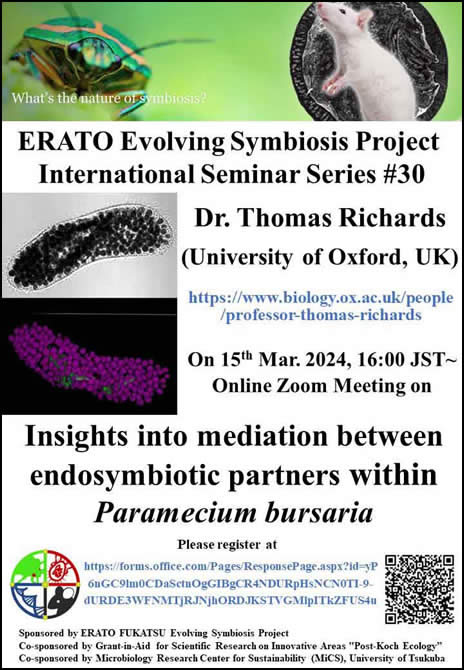第30回共生進化機構国際セミナーをオンライン開催しました。
多様な内部共生進化の研究で知られるProf. Thomas Richards (University of Oxford, UK)にご講演いただきました。

Abstract: Paramecium bursaria has emerged as an ideal model for exploring stable but facultative endosymbiotic interactions. This is largely due to the pioneering and beautiful work led by researchers in Japan. Achieving interaction stability in facultative endosymbiotic interactions is an evolutionary conundrum. Why do two fundamentally selfish evolutionary lineages work together? How is the drive towards partner exploitation --which would otherwise collapse facultative endosymbiotic interactions or render them obligate interactions driving organelle evolution-- suspended? Our research team has become interested in the genetic and cellular systems that can drive interaction stability in facultative endosymbiosis. Here I will discuss our progress in developing a strain of Paramecium bursaria for genomic and cell biology research. I will then discuss our work to explore how Paramecium bursaria interacts with its endosymbiotic algae through amino acid metabolism and chitin detection. I will then briefly outline how viruses --the arch manipulators of eukaryotic cells-- likely played a role in the evolution of this interaction.
ERATO Evolving Symbiosis Project International Seminar Series #30
第30回共生進化機構国際セミナー
Sponsored by ERATO FUKATSU Evolving Symbiosis Project
主催:ERATO深津共生進化機構プロジェクト
https://www.jst.go.jp/erato/fukatsu/
Co-sponsored by Grant-in-Aid for Scientific Research on Innovative Areas "Post-Koch Ecology”
共催:新学術領域研究「ポストコッホ生態」
https://postkoch.jp/about/
Co-sponsored by Microbiology Research Center for Sustainability (MiCS), University of Tsukuba
共催:筑波大学微生物サステイナビリティ研究センター(MiCS)
https://www.mics.tsukuba.ac.jp/


